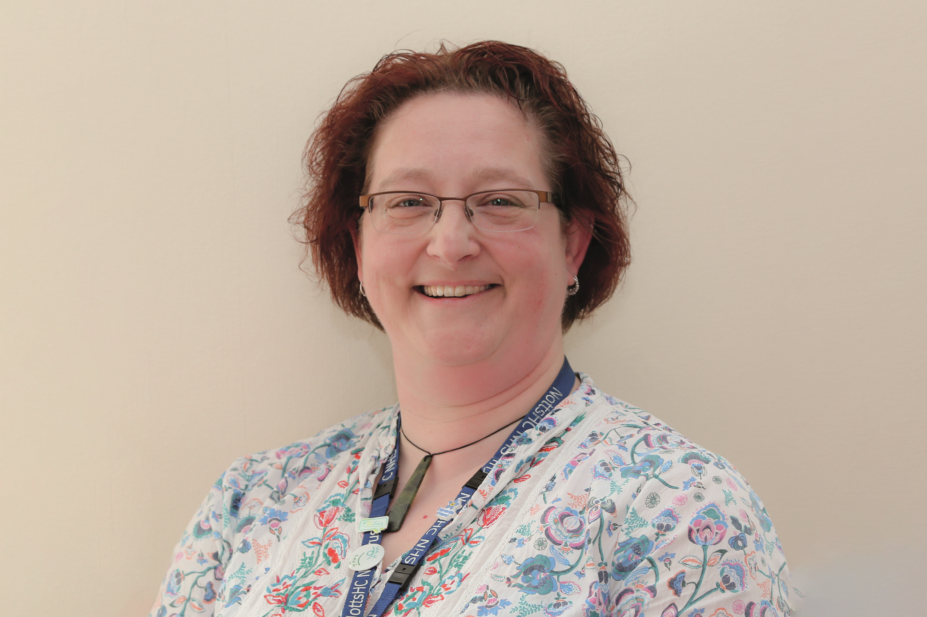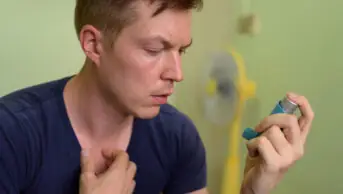
Courtesy of Nikki Holmes
When Nikki Holmes qualified from Nottingham University as a pharmacist in 1993, working in forensic mental health was not an obvious career option. “In those days there wasn’t much in the way of mental health trusts and we didn’t have the number of specialist mental health pharmacists we do now,” she says.
Her first exposure to mental health pharmacy was during her preregistration year working in a mental health inpatient unit. Immediately, Holmes fell in love with the specialty. “[In comparison to other specialties] I liked the way of working and how treatment wasn’t so clear cut. We weren’t just following protocols, we worked collaboratively and we thought about the patient.”
In 1996, an opportunity to work as a specialist pharmacist combining both mental health and general medicine arose at Pontefract General Hospital in West Yorkshire. It was at this point she realised that mental health pharmacy was for her and decided to specialise. “[Mental health teams] seemed a lot less hierarchical, more patient-centred and holistic in their approach. Pharmacists were required to have extensive clinical knowledge, and apply it to an individual person to get the best possible outcome for them.”
Pharmacy in a secure facility
Working in Pontefract led to numerous job offers in mental health — one from New Zealand and the other from Rampton Hospital in Nottinghamshire, a high secure facility providing clinical mental health and personality disorder services at local, regional and national levels for more than 300 patients, including the hearing impaired. “I was offered both, which was a surprise! At that point I was not in the right head space to move to the other side of the world, so in 1997 I started at Rampton as a clinical pharmacist — my first experience of forensic mental health,” she explains.
Holmes still has clear memories of driving onto the site at Rampton and thinking “Oh, this is going to be interesting!’”
Going full circle
After three years working at Rampton, Holmes received another job offer from New Zealand and decided it was time to take the plunge and pack her bags. “I thought, I really need to do this now, I might not get another go!”
Initially Holmes spent a year in Wellington working in mental health services at Porirua Hospital for Capital and Coast District Health Board before moving to Auckland to work solely in forensic mental health at Mason Clinic. Holmes’s role was purely clinical, but she subsequently secured a permanent managerial role after covering her manager’s maternity leave.
While in New Zealand, Holmes attained her postgraduate certificate and postgraduate diploma in psychiatric pharmacy from Aston University. She then became the first pharmacist working overseas to be credentialed as a specialist mental health pharmacist by the College of Mental Health Pharmacy (CMHP), one of the highlights of her career. Others include leading the first service in the country to swap from branded to generic clozapine and the first high secure service to go smoke free. Holmes also became heavily involved in running the New Zealand mental health pharmacy special interest group and organised their annual conference.
One career highlight was leading the first service in New Zealand to swap from branded to generic clozapine
Holmes remained in New Zealand for 11 years and the country now occupies a special place in her heart. “I can work there because I’ve kept my professional registration. I’m a citizen, I’ve got the passport, and I have friends and family there,” she says. However, the peak district and Yorkshire will always be home, and in 2011, she returned to the UK.
Holmes continued to work in forensic mental health — initially as a senior clinical pharmacist for Lancashire Care NHS Foundation Trust and then as pharmacy manager for Secure and Complex Care Services at Birmingham and Solihull Mental Health NHS Foundation Trust.
In 2015, Holmes came full circle and returned to Rampton as head of pharmacy, where she currently works with a team of 12 — a mixture of pharmacists, pharmacy technicians and pharmacy assistants. Holmes’s role encompasses overseeing pharmacy input to high, medium and low secure services, and several prisons. In addition, Holmes completes half a day of clinical work per week, as it keeps her grounded and helps maintain credibility as a mental health pharmacist. She attends clinical meetings, works with clinical teams to optimise patient medication, and provides medication counselling for patients when needed.
From high secure to recovery
Holmes and her team work with individuals who have mental illness or learning disabilities that have come into contact with the criminal justice system in some way. These include those already convicted and detained as prisoners who require hospital services, offenders awaiting assessment for fitness to engage with the criminal justice process, or residents of low security mental health facilities requiring treatment in higher security settings due to illness and the potential risks they pose.
It is the way in which their illness presents that makes some individuals a risk to themselves and/or others
“Although we are secure services, we are not necessarily dealing with individuals who are more unwell than patients in a non-secure setting. It is the way in which their illness presents that makes them a risk to themselves and/or others,” Holmes states. Being in high secure is not a life sentence for individuals as the focus at Rampton is on recovery. Holmes explains, “We do move people on, we do get people better, we do manage and mitigate risk which, in a way, is what forensics is all about.”
According to Holmes, the role of the pharmacist in secure services is no different, as essentially, “You are individualising a patient’s medication in order to get the best possible outcomes.” However, consideration always needs to be given to the factors associated with mental health conditions.
Intelligent risk taking
Holmes says, “When on the wards you need to make sure you have your personal alarm with you, that you’re using the keys in the right way, that the nurses know where you are and that you are in the line of sight at all times.” All staff at Rampton undergo a comprehensive security induction. All staff carry keys, have personal alarms and a radio sits in the department for communication. This ensures everyone is aware of what is going on around the site. “It’s about the difference between hazard and risk,” explains Holmes. “Our services are sometimes described as engaging in intelligent risk management and intelligent risk taking.”
Being mindful of your own safety when having necessary conversations with patients, are nuances that you need to weave into your approach
Holmes recalls working with a young man taking clozapine for treatment-resistant schizophrenia. His symptoms were well controlled, but he found the side effects tricky to deal with. “At his request, we agreed to work with him to switch to another antipsychotic, but as always it needed to be an informed decision. We discussed that clozapine is the best option for treatment-resistant schizophrenia, and although a different antipsychotic may have fewer side effects, I could not guarantee it would work for him.” Before the switch, Holmes spoke to the patient alone as he was well, and it was safe to do so. However, after the switch his condition deteriorated and consequently Holmes had to be accompanied when she had the discussion with him about restarting clozapine. “Being mindful of your own safety when having necessary conversations with patients, are the kinds of nuances that you need to weave into your approach,” she says.
When an incident does occur, the incident management team is on hand to help. Counselling is also available for staff who have been involved in a traumatic event and require support. “[Working in a secure facility] does change the way you think about the world because you might see things you would not see elsewhere,” Holmes reflects. “It changes the way you think, not necessarily in a bad way, but you assess things differently.”
The mental health pharmacy community
Holmes became a member of the CMHP when she specialised, and for the last two years, has been its president. She stepped down in November 2017, but will remain on college council as immediate past president. The CMHP works to benefit patients through advancing education and research in the practice of mental health pharmacy. It runs educational courses for pharmacists both new to mental health as well as for specialist pharmacists; working closely with the Royal Pharmaceutical Society, the Centre for Pharmacy Postgraduate Education (CPPE) and other organisations to try and influence care for people with mental illness. “One of our strategic aims is to increase collaboration with our primary care colleagues — this is where most mental illness is and where most of the people who need support are,” she says.
The CMHP has been an important source of support throughout Holmes’s career, both in the UK and in New Zealand. Holmes feels her expertise and confidence in her expertise come from the credentialing she gained from CMHP. “We are lucky that we have further [postgraduate] qualifications in mental health pharmacy — we are building credibility around our expertise in a way that historically, you could not,” she explains.
Cinderella services
The CMHP is working to encourage pharmacy students and newly registered pharmacists to consider mental health as a potential specialty. For Holmes, hands-on experience at the beginning of her career was key to realising the merits of pharmacy in mental health. “People talk about ‘Cinderella’ services — mental health is generally something you get into by accident and you either love it or you can’t stand it,” she says.
Holmes admits that she was never absolutely passionate about working with physically ill patients in the same way as working with individuals who have mental illness. She explains, “In mental illness you have the privilege of witnessing an individual when they are at their worst and to walk alongside them on their journey to eventually see them at their best.”


